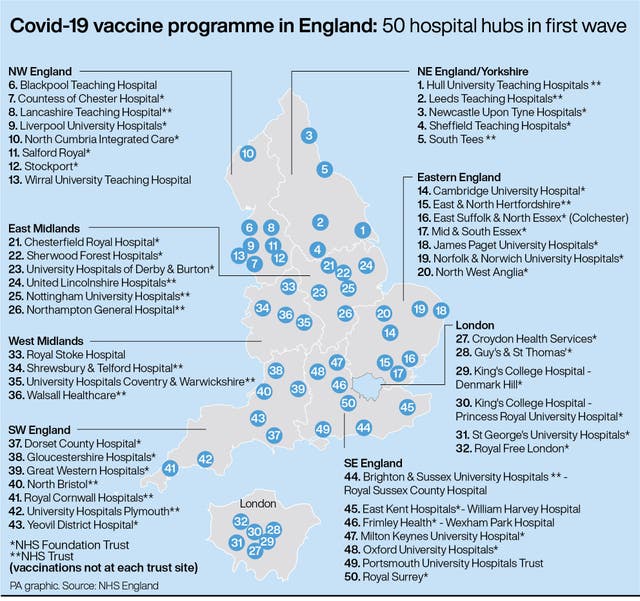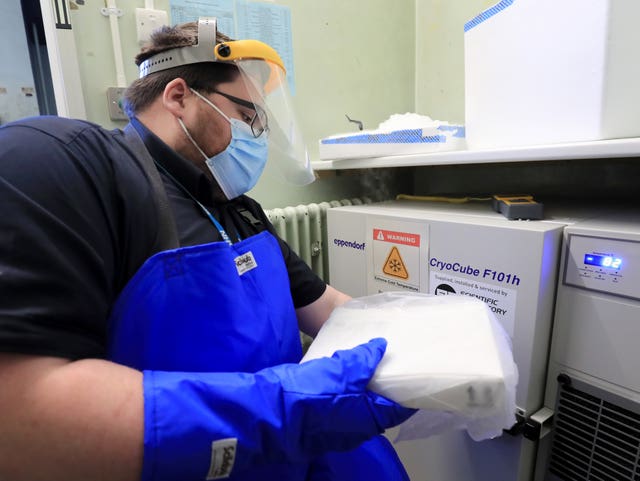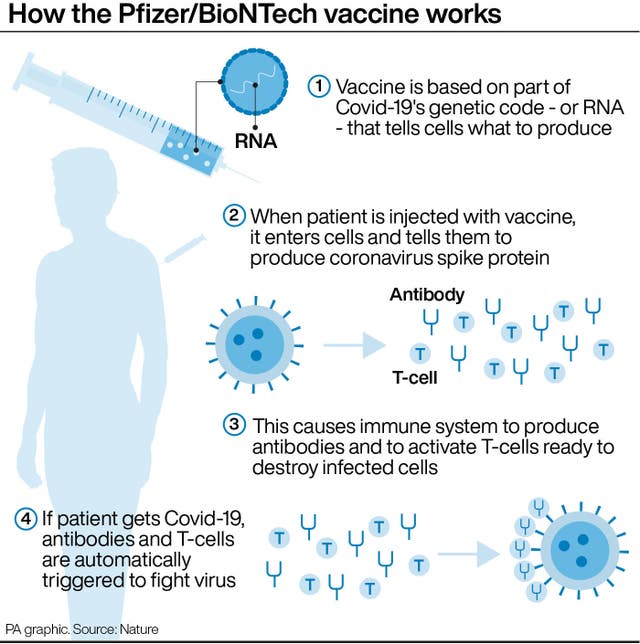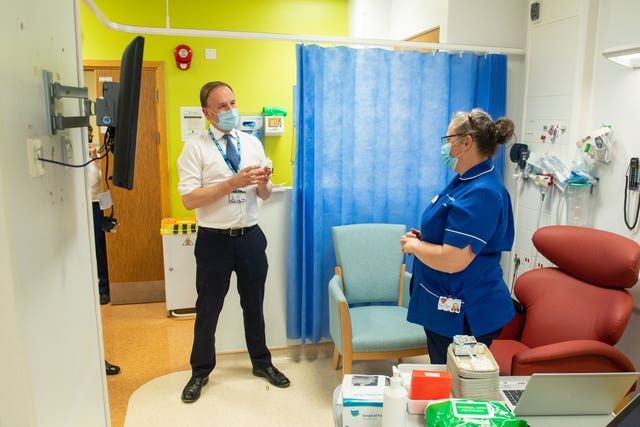The UK is taking a “huge step forward” in its fight against Covid-19 as the country’s vaccination programme gets under way, Boris Johnson has said.
Vaccinations will be administered at dozens of hospital hubs across the country from Tuesday – dubbed “V-Day” by Health Secretary Matt Hancock.
The Prime Minister said he was “immensely proud” of the scientists who have developed the new jab and praised NHS staff for working “tirelessly” to make the vaccine rollout happen.
Tuesday marks the start of the NHS’s largest ever vaccination programme, with the UK becoming the first country in the world to start vaccinating people with the Pfizer/BioNTech jab.
The vaccine has been shown to be 95% effective against Covid-19 and works across all age groups, including the elderly.
Among the first people to receive it will be the over-80s, care home staff and health workers, with the eventual aim of vaccinating millions of people against coronavirus.
After an initial dose, a second jab must be given 21 days later.
Mr Johnson said: “Today marks a huge step forward in the UK’s fight against coronavirus, as we begin delivering the vaccine to the first patients across the whole country.
“I am immensely proud of the scientists who developed the vaccine, members of the public who took part in trials, and the NHS who have worked tirelessly to prepare for rollout.

“But mass vaccination will take time, and we must remain clear-eyed about the challenges that remain.
“As the programme ramps up in the weeks and months ahead, it is as important as ever to keep to the Covid winter plan – following the rules in your area and remember the basics of hands, face and space.”
Some 800,000 doses of the vaccine have been delivered to UK hospital hubs – enough for 400,000 people – but it is unclear when more doses will arrive from the manufacturer.
Overall, the UK has secured 40 million doses of the Pfizer vaccine which is enough for 20 million people.
GP surgeries have been told to prepare to start staffing some GP-led vaccination centres from next week, with more opening up as stocks of the jab arrive.

Across England, 1,250 primary care networks have been asked to designate a single practice to administer vaccines in their area which would be capable of delivering vaccines from 8am to 8pm, seven days a week, and on bank holidays if needed.
Vaccination centres treating large numbers of patients in sporting venues and conference centres across England will also be mobilised when further supplies come on stream.
Health Secretary Matt Hancock said: “We will look back on today, V-Day, as a key moment in our fight back against this terrible disease, and I am proud our health services across the United Kingdom are about to embark on our largest ever vaccination programme.
“With over-80s and frontline health and care staff receiving their vaccinations from today, the whole country will breathe a collective sigh of relief as our most vulnerable loved ones start to be given protection from the virus.
“Now’s the time to sit tight and remain patient until you get notified by the NHS that it’s time for your vaccination.

“We can see light at the end of the tunnel but still have a long way to go.”
NHS England chief executive Sir Simon Stevens said the start of the mass vaccination programme marks a “decisive turning point” in the pandemic fight.
He said: “Coronavirus is the greatest health challenge in NHS history, taking loved ones from us and disrupting every part of our lives.
“Hospitals have now cared for more than 190,000 seriously ill Covid-19 patients and have seen beds fill up again in recent weeks.
“The deployment of this vaccine marks a decisive turning point in the battle with the pandemic.”
Care home residents in Scotland will receive the jab from next week, although no date has yet been set for residents in England.

Sir Simon said he is confident that vaccinations can begin to be offered in care homes in England “well before Christmas”, adding there is “every prospect” that by spring all high-risk vulnerable groups will have been vaccinated.
The Pfizer vaccine needs to be stored at minus 70C before being thawed out and can only be moved four times within that cold chain before being used.
It means most early vaccinations will take place in hospital hubs while experts work on deploying doses to other settings.
Defence minister James Heappey told the Commons on Monday that 56 armed forces personnel had been deployed in efforts to construct the Covid-19 vaccination centres.
He said the Army was also assisting with vaccine rollout plans, with 60 military planners integrated into the UK’s vaccine taskforce.
The distribution of the vaccine across the UK is being undertaken by Public Health England and the NHS in England, Scotland, Wales and Northern Ireland through systems similar to those used for usual NHS vaccine programmes.
The COVID-19 vaccine has undergone rigorous tests, including clinical trials, that are globally recognised as having the highest safety standards.
— NHS (@NHSuk) December 7, 2020
The Scottish Government has received 65,000 doses of the Pfizer jab so far, with more on the way.
In Wales, the first set of vaccines will be available to just under 19,000 people, while Northern Ireland has 25,000 doses available in its initial batch.
Race relations campaigner Dr Hari Shukla, 87, from Tyne and Wear will become one of the first people in the world to get the Covid vaccine. He will receive the jab in Newcastle on Tuesday.
He said: “I’m so pleased we are hopefully coming towards the end of this pandemic and I am delighted to be doing my bit by having the vaccine, I feel it is my duty to do so and do whatever I can to help.”
Meanwhile, NHS England said on Monday that 190 people who tested positive for coronavirus have died in hospital in England, bringing the total number of confirmed deaths in hospitals to 42,579.




Comments: Our rules
We want our comments to be a lively and valuable part of our community - a place where readers can debate and engage with the most important local issues. The ability to comment on our stories is a privilege, not a right, however, and that privilege may be withdrawn if it is abused or misused.
Please report any comments that break our rules.
Read the rules here